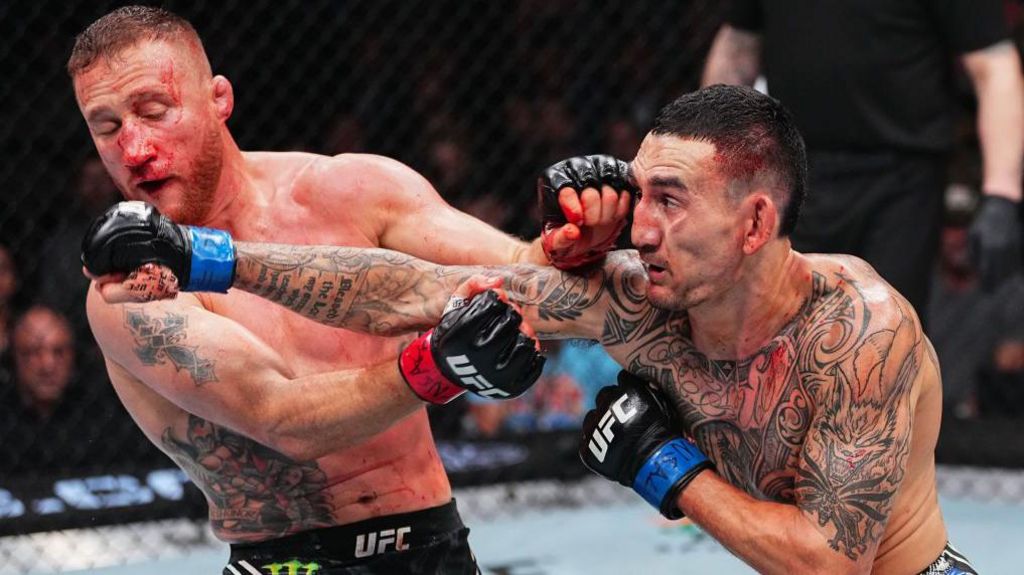Sleep doctors, 5am bed time & chasing the 0.1% – inside UFC 304
Britain’s Leon Edwards has spent 10 weeks altering his body clock to prepare for the defence of his welterweight title against Belal Muhammad at UFC 304.

This video can not be played
To play this video you need to enable JavaScript in your browser.
When Leon Edwards and his team got together to discuss the implications of fighting at 5am, there was one man who knew first hand of its significance.
In 2020, former UFC featherweight champion Alexander Volkanovski was woken in the middle of the night before his title defence against Max Holloway by the United States Anti-Doping Agency (Usada) to provide a urine sample.
Although Volkanovski won the fight with a razor thin split decision, it was a disjointed performance which the Australian put down to having his sleep disrupted.
Dietician Jordan Sullivan was part of Volkanovski’s team then, but now works closely with British UFC welterweight champion Edwards.
Birmingham’s Edwards, 32, will make the third defence of his belt against American Belal Muhammad in the main event of UFC 304 at Manchester’s Co-op Live on Saturday, with the fight expected to take place about 05:00 BST on Sunday morning.
The opening bout starts at 23:00 BST, with the card timed to cater to the audience in the United States, which is five to eight hours behind the UK for the vast majority of Americans.
“Volkanovski was the one with me when I went ‘OK, this is extremely important’,” Sullivan told BBC Sport.
“Volk prepared perfectly but you saw the effects of Usada waking him up in the middle of the night in the fight with Holloway.
“So when Leon got the call that he’d be fighting at 5am, I said ‘we can’t let anything like that happen again’.”
Sullivan recommend a sleep and performance specialist he’d worked with previously called Dr Ian Dunican.
Dunican, who is based in Australia, has helped a number of high level athletes across a number of sports fine-tune their sleeping patterns to optimise performance.
“First we did a full assessment to figure out if you’re an early morning person, a late night person or you’re kind of in-between,” said Sullivan.
“And from that you figure out what’s the best way to make the environment so when you get up to fight at 5am, your body thinks this is a normal day. We gave ourselves 10-12 weeks.”
‘Leon responded perfectly’
Edwards won the title off Kamaru Usman in stunning fashion in 2022 before retaining it in a rematch six months later, with his last defence coming against Colby Covington in December.
In preparation for those bouts, Edwards would usually wake up at about 08:00 BST, train at 10:00 and 18:00, before going to sleep at about midnight, according to Sullivan.
For this camp, on the advice of Dunican, Edwards has been gradually shifting his timings later over a 10-week period so as it gets closer to fight week, he will be waking up five hours later at 13:00 BST, training at 17:00-18:00 and 21:00-22:00, before going to bed at 05:00.
Edwards will keep the same routine before the fight, going to bed at about 05:00 on Saturday before waking up at about 13:00.
“You can’t just wake up and go straight to it because it’s like when you travel between time zones or have a nap in the afternoon – you wake up and feel terrible because you’re out of your body’s natural rhythm,” said Sullivan.
Edwards also had to create an artificial environment to help convince his body it was time to sleep, despite going to bed nearer to sunrise.
“We’re natural animals, we see the sun and want to wake up, so we got blackout curtains, really high quality eye masks, and made sure he got sun exposure when he woke up,” said Sullivan.
“Leon responded perfectly and it’s all in his sleep data, the sleep quality, duration and respiratory rate – Dunican said he’s probably in the top 0.5% of sleep subjects he’s worked with.”
‘That’s why Leon’s the best in the world’
This video can not be played
To play this video you need to enable JavaScript in your browser.
During fight week, all media interviews, news conferences and weigh-ins are taking place about five hours later than usual to fit with the fighters’ later sleep patterns.
Britain’s Tom Aspinall, who defends his interim heavyweight title against American Curtis Blaydes in the co-main event, made light out of the situation.
Aspinall has been telling reporters he has been dipping his hands in petrol in the early hours of the morning to harden his knuckles.
When asked if the story was true, Aspinall shakes his head and bursts out laughing.
“I’ve got a lot of Traveller friends and they joke about it all the time, it’s like an old gypsy way of doing stuff,” Aspinall told BBC Sport.
“It’s just a joke – I was hoping just for my Traveller friends to have a giggle because we joke about it all the time.”
Other fighters, like Arnold Allen and Blaydes, meanwhile, have joked that they are sick of being asked about the timings of their fights.
Edwards appears to be the fighter who has prepared his sleep pattern the most and Sullivan says it is this attention to detail which makes him a champion.
“The crazy thing about it is for 80% of the roster this stuff probably doesn’t make a difference, but at the tip of the spear in pound-for-pound contention, every little bit counts,” said Sullivan.
“You need to know you’ve done every little thing possible so it’s your best performance and that’s Leon – his diet, strength and conditioning, technical skills, his sleep, how he manages his relationships, his time with people, everything.
“There’s no 0.1% that’s left unturned and that’s why he’s the champion.”
Related Topics
-
-
28 April

-






